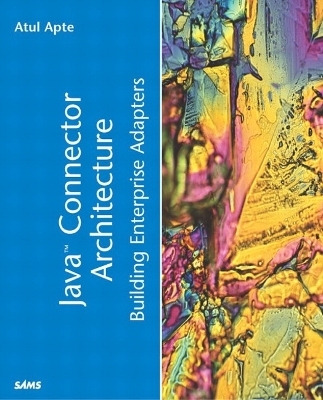
Java Connector Architecture
Sams Publishing (Verlag)
978-0-672-32310-2 (ISBN)
Java Connector Architecture (JCA) presents the JCA and identifies the scope in which a JCA-based adapter operates. The book quickly moves to the design methodologies employed in adapter using the JCA. The book then progresses to information about testing and deploying adapters in a production environment. Java Connector Architecture defines a development methodology and suggests analysis and design patterns, which are useful both for building connectors to legacy applications and for designing adapters for new applications.
Atul Apte has been leading software development projects in the message-based middleware domain for close to 20 years. His experience includes coding in C, C++, and Java. until recently, Apte served as director of adapter development at SAGA Software, acquired by Software AG of Germany. His now the founder of iConexio Technologies, Inc., a Canadian company focused on developing standards-based application integration frameworks and tools.
(NOTE: Each chapter concludes with a Summary.)
Introduction.
1. Introduction to Adapter Technology.
Understanding Adapters. History and Evolution of Adapters. Adapter Contexts. Definition of Application Integration Adapter. Application Models. Points of Integration.
2. Overview of J2EE.
Introduction to J2EE. J2EE Specification. J2EE Architecture. J2EE Components. J2EE Reference Implementation.
3. Overview of EJB.
Introduction to EJB. Understanding EJB Roles. Types of EJB. Client Access. Adapters and Beans.
4. Adapter Reference Model.
Role of Software Reference Models. Choosing Reference Models. Adapter Requirements and Architecture Models. Objectives of the Logical Adapter Reference Model. Layered Architecture. Use Case Models. Logical Adapter Reference Model. Design Considerations. Applying the Logical Reference Model.
5. Role of XML in Adapters.
Overview of XML. Document Type Definitions (DTDs). XML Schema. XSL-Based Transformation. XML Parsers. Using XML in Adapters. Why XML Will Not Replace Adapters.
6. Introduction to Web Services.
Benefits of Web Services. Application Services (A Conceptual Model). Simple Object Access Protocol (SOAP). Universal Description, Discovery, and Integration (UDDI). Web Services' Impact on Resource Adapters.
7. Adapter Development Methodology and Best Practices.
Understanding Integration Project Objectives. Managing Integration Teams. Role of Adapters in Integration Project. Adapter Analysis. Adapter Design. Adapter Coding. Adapter QA. Deploying Adapters. Adapter Maintenance.
8. Pitfalls of Adapter Development.
Strategy and Planning Pitfalls. Architecture Pitfalls. Analysis and Design Pitfalls. Development and Implementation Pitfalls.
9. Testing Adapters.
The Importance of Testing. Stages of Adapter Testing. Types of Adapter Testing. Testing Environments. Gathering Test Data. Planning Regression Tests.
10. Overview of JCA.
Objectives of JCA Specifications. Roles Specified in the JCA Specifications. Understanding Connection Management. Understanding Transaction Management. Understanding Common Client Interface. Overview of JCA Security. Support for Packaging and Deployment.
11. Developing J2EE Resource Adapters.
Documenting ASCII File Adapter Integration Scenarios. Designing the Logical Reference Model. Packaging and Release.
12. Deploying Adapters.
Deployment Objectives. Adapter Version Control. Deployment Scenarios. Defining Deployment Requirements. JCA Adapter Deployment Descriptor. Deployment Plan Template.
13. Customizing Adapters.
Adapter Customization Domains. Example of Customizable Frameworks.
14. Developing Integration-Ready Applications.
Importance of Integration Readiness. Characteristics of Integration-Ready Applications. Refactoring Legacy Applications. Designing New Integration-Ready Applications. Rating Integration Readiness.
15. Trends in Adapter Technology.
Beyond JCA Resource Adapters. Adapters Integrated with IDE and Operating Systems. Adapter Certification Centers. Adapter Vendors Will Be the Preferred Source for Adapters. Standardization of Adapter Platform and Technology. Tools for Adapter Customization. Impact of Web Services. Adapter Patterns Will Emerge. Proprietary Adapters Will Be Displaced.
= 16. Components of Integration Technology. Integration Platform. Operating Systems. Adapter Interactions with Integration Components.
17. Source Code for ASCII File J2EE Adapter.
Environment for the ASCII File J2EE Adapter. Access Layer Source Code. Engine Layer Source Code. Shared Service Layer Source Code. Test Harness.
Appendix A. Glossary.
Appendix B. References.
Books. Resources on the Web.
Index.
| Erscheint lt. Verlag | 22.5.2002 |
|---|---|
| Verlagsort | Indianapolis |
| Sprache | englisch |
| Maße | 230 x 186 mm |
| Gewicht | 562 g |
| Themenwelt | Informatik ► Programmiersprachen / -werkzeuge ► Java |
| Mathematik / Informatik ► Informatik ► Web / Internet | |
| ISBN-10 | 0-672-32310-9 / 0672323109 |
| ISBN-13 | 978-0-672-32310-2 / 9780672323102 |
| Zustand | Neuware |
| Haben Sie eine Frage zum Produkt? |
aus dem Bereich


